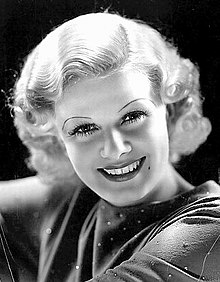
Back Jean Harlow Afrikaans Jean Harlow AN جين هارلو Arabic جين هارلو (ممثله) ARZ Jean Harlow AST Cin Harlou Azerbaijani جین هارلو AZB Джийн Харлоу Bulgarian জিন হার্লো Bengali/Bangla Jean Harlow BS
Jean Harlow | |
|---|---|
 Harlow, 1930s | |
| Born | Harlean Harlow Carpenter March 3, 1911 Kansas City, Missouri, U.S. |
| Died | June 7, 1937 (aged 26) Los Angeles, California, U.S. |
| Resting place | Forest Lawn Memorial Park |
| Occupation | Actress |
| Years active | 1928–1937 |
| Political party | Democratic |
| Spouses | Charles McGrew
(m. 1927; div. 1929) |
| Partner | William Powell (1934–1937) |
| Signature | |
 | |
Jean Harlow (born Harlean Harlow Carpenter; March 3, 1911 – June 7, 1937) was an American actress. Known for her portrayal of "bad girl" characters, she was the leading sex symbol of the early 1930s and one of the defining figures of the pre-Code era of American cinema.[1] Often nicknamed the "Blonde Bombshell" and the "Platinum Blonde", Harlow was popular for her "Laughing Vamp" screen persona. Harlow was in the film industry for only nine years, but she became one of Hollywood's biggest movie stars, whose image in the public eye has endured. In 1999, the American Film Institute ranked Harlow number 22 on its greatest female screen legends list.[2]
Harlow was first signed by business magnate Howard Hughes, who directed her first major role in Hell's Angels (1930). After a series of critically failed films, and Hughes' loss of interest in her career, Metro-Goldwyn-Mayer bought out Harlow's contract in 1932[3] and cast her in leading roles in a string of hits built on her comedic talent: Red-Headed Woman (1932), Red Dust (1932), Dinner at Eight (1933), Reckless (1935) and Suzy (1936). Harlow's popularity rivaled and then surpassed that of MGM's top leading ladies Joan Crawford, Greta Garbo and Norma Shearer. She died at the age of 26 of kidney failure while filming Saratoga. MGM completed the film with the use of body doubles and released it less than two months after her death; it became the highest-grossing film of 1937, as well as the highest-grossing film of her career.
- ^ Mashon, Mike; Bell, James (April 30, 2014). "Pre-Code: Hollywood before the censors". Sight & Sound. Retrieved December 19, 2021.
- ^ McDonald, Paul (2012). Hollywood Stardom. John Wiley & Sons. ISBN 9781118321669.
- ^ Vieira, Mark A. (2009). Irving Thalberg: boy wonder to producer prince. Los Angeles: University of California Press. p. 178. ISBN 978-0-520-26048-1.